#I'll probably write an analysis of the episode like the good old times
Text
1-year anniversary post and future projects

My blog turned 1-year old today! 😃 (I also have a new blog banner and profile pic for the occasion!) I was lowkey hoping I'd hit the 1,000 follower milestone before then, but I got close - about 890 followers as of now! I'm very humbled that so many people enjoy my SxF content ❤️ Thank you all so much for your Likes, Reblogs, and kind messages~ Even though I wish I had joined the SxF fandom sooner, better late than never! The series has been around for about four years now, which is still a relatively short time for a popular shonen manga. So I'm hoping there will be plenty more SxF content to indulge in for years to come!
As you've probably seen, I've been reblogging my Twiyor analysis posts as a build-up to my continuation of that project for season 2 of the anime. And I'm happy to report that my planned start date for new analysis posts will be Tuesday, December 12th! On that day I'll post the new installment, Part 19, with a new post each Tuesday after until I finish covering the season 2 episodes. I know it seems like I'm dragging it out, but it takes a long time for me to not only write each post, but to revise and proofread them as well...the more chances I get to proofread my posts over time, the better they turn out. I also want to make sure I don't get too far ahead of the current episodes (since I still want to make the posts manga-spoiler free as much as possible). Since season 2 is only going to be 12 episodes, there won't be as many posts as last time, but the topics are just as compelling! I've been so excited to finally delve into analyzing the cruise arc 😄
I should also mention that late December/early January are going to be very busy times for the fandom: there's the movie release, the game release, the season finale, another art book that I'll want to scan, and the light novel being released in English! Of course I'll be making posts covering all of this, as well as my usual merch and chapter/episode review posts. I'm also planning to do some kind of post mini-series for the game where I write about my experiences with it in a daily journal kind of format. We'll see...there's going to be so much to cover at the end of the year, I hope I won't get overwhelmed 😅
Anyway, thank you all again for a wonderful year of SxF goodness~ Here's to many more years of joy from our beloved fake family!
109 notes
·
View notes
Note
The biggest truth that solves all plot holes in Miraculous: they’re bad writers.
No excuse of this being a kids show works because if you want to be not held accountable for holes then fine act like SpongeBob
but you can’t have everything
Yeah. I didn't give a damn about the "plot holes" in Seasons 1-2, or even Season 3 to some extent, because those were mostly monster of the week type of episodes. Sure, there were some semblances of plot and world-building, but it was still mostly episodic and the show still mostly focused on being goofy and entertaining, so I turned of my brain and enjoyed it greatly.
But then Season 4 came along and tried to change the tone of the series entirely, from being a monster of the week to having an actual plot and overarching story, and proved that the writers for the show don't really know how to do that? And then they started digging their holes deeper and deeper and made so many baffling decisions in the writing that the show just turned into a huge mess, full of unresolved plot points, underdeveloped characters, convoluted storytelling, and many unfortunate implications.
And it's like you said. If the show wants me to take it seriously, I will. I'm going to look at a show for what it is. When the show was presenting itself as a goofy episodic show to entertain kids, I judged it as such and I enjoyed it, because Miraculous is good at that. I loved Seasons 1 and 2. Season 3 less so, because it started The Plot™, and it wasn't good at that, but I still enjoyed a lot of it. But Seasons 4 and 5 came along and demanded I take them seriously, so I did. And they weren't good, because the writers aren't good at that kind of storytelling. They're good at goofy shenanigans, but not at complex plots and characters.
And "it's a kids show" is not an excuse. Kids shows can explore complex subjects and can have great plots and characters (ATLA). But it still has to be, you know, good. Kids aren't stupid. I know that kid me would have also hated the Season 5 finale, because Adrien is my favorite, and he wasn't there, and they made Marinette lose.
But at the same time, this is still a show for kids. Miraculous is a kids show, and therefore, it has the responsibility to not promote harmful messages. What would an abused child who is in a situation similar to Adrien's think when they see him call Gabriel a hero in the finale and say that he doesn't know if he'll ever be like him? Children aren't stupid and incapable of understanding anything, and they do deserve good quality of writing, but they also aren't capable of complex media analysis. And when you see people making these long-ass posts talking about how the finale is actually not what it seems like, actually, you have to consider the target audience. A kid isn't going to be picking up on the deep and nuanced hidden meanings in Gabriel final moments that prove he hasn't changed. They are going to see Gabriel hugging his wife, smiling and surrounded by pretty and warm lights while beautiful music plays. If we have to write all these long theories justifying the ending and trying to suggest that what was obviously portrayed on the screen isn't what the show is really trying to say, is a kid really going to get it?
Which is why you see so many people saying shit like "aw Gabriel was really a good man," or "he was never the villain." These people are probably like, 12–13 year olds, and they are watching a show meant for kids. And as a kid, I'm not going to like that Adrien wasn't in the finale, sure, but does that mean I'll understand that Gabriel is supposed to still be a bad guy when the show tells me to my face that he isn't?
It's not like the show can't deal with complex and nuanced characters. I myself have written many character analyses and have treated these characters as complex and nuanced, and they could have been. Again, look at ATLA. Zuko, for example, is a very complex character, but he is still brought to life in a way that allows kids to understand all the nuances and subtleties in his story clearly. There is a lot of rather complex symbolism, but the kids get the jist of it and can understand his story well, even if they don't catch all the minute details. Hell, take Azula. The show doesn't shy away from showing her doing bad things, but it also makes it blatantly obvious that you should feel sorry for her in the end, and that she's also a victim. Again, kids can understand this.
And that's where Miraculous falls flat. The writers fucked up their message. They wrote some deeply problematic stuff, where the abuser won. The bad guy won, but he was actually a good guy. So, people who act like Gabriel maybe aren't all that bad. What Gabriel did in the end was good, and we should all try to be like him. Kids aren't going to question it. In this way, "it's a kids show" goes from being an excuse to being a problem. It's what it says on the tin, and what's on the tin is not good. That's how I feel.
Thank you for your ask!
67 notes
·
View notes
Note
I watched the episode 1 of gentlemen jack season 2 and it felt a bit abrupt compared with the entire season 1. The season 1 was more delicate.
Anonymous asked: Did Sally didn't direct the season 2? That's why the episode 1 it felts abrupt to me. I prefer the tenderness, delicacy and care of the first season. I'm scared to see the next episodes.
I’m answering these two asks together since they’re very similar (probably from the same anon, anon tell me if I’m wrong).
The first thing I wanna say is that I quite agree with your sentiment – that was also my first impression – the episode is very fast paced, there’s no time to breathe, everyone talks a lot, it is very dense, very energetic, so much so that you can’t keep up, almost strenuous to watch and you feel tired at the end. There are also a lot of storylines being established (the coal, the tribe, the hotel, Mariana drama, Anne’s own emotional journey, Ann moving into Shibden, the Listers, the servants, etc. etc. – it is A LOT).
BUT
I’ve rewatched the ep multiple times (I at least did a rewatch per day so you do the math) and even if I’m still a bit on the fence about this whole vibe, I do believe it’s done on purpose and it does serve the narrative – hear me out.
At the start of this new season we find Anne at the top of her game, she has a wife, money, she’s doing business left and right, she’s renovating Shibden – the episode simply matches her energy which is insane! No one can keep up with her and we, as viewers, are not supposed to keep up with her either. The episode makes us feel exactly how we’re supposed to feel while we watch her spin all these plates.
Anne’s running on high adrenaline and everything in the episode tells you that: the music has been enriched; there’s always something going on in the background, people talking, working; there are a lot of wide shots which don’t really let us get close and intimate with the characters (a big difference from season one); there’s a lot of back and forth and Anne goes in the same places multiple times during the episode and it all feels a bit too much. Everything is too much. Even Anne’s looks to the camera feel a bit too much. Anne is all go-go-go. It is overwhelming to watch.
Because the way the episode is constructed is supposed to make you feel this way and because it serves the story, I can say that, even if personally it’s a bit too much for me (I do prefer, like you, the delicacy of the first season waaay more) it does make total sense that this is the way the first episode unravels.
Like you, I did miss Sally’s touch but I’m also very curious to see how everything evolves from here – at some point Anne is gonna hit rock bottom – I’m very curious to see how the tone of the show will change accordingly to Anne’s feelings – that’s at least how I think things will go, I guess all we can do is wait and see :)
Thank you for your messages and I hope you have a good weekend!
#ask#gentleman jack#anonymous#I'll probably write an analysis of the episode like the good old times#there are a couple of scenes that I believe are just exquisite#on so many levels#anatomy of a scene: gentleman jack
56 notes
·
View notes
Text
Jon Snow, Manfred & The Byronic Hero: Part 2
Previous Posts: PART 1
Hopefully Part 1 served as a good introduction on the topic and characteristics of the Byronic Hero, as well as how Jon Snow in particular is likely an iteration of this figure. But now we come to the real meat of this meta series — a closer look at Byron's dramatic poem Manfred (1816–1817), and more importantly, its titular character in comparison to Jon Snow. I was originally going to do an analysis and comparison of two key episodes in Manfred and A Storm of Swords, Jon VI, but have since decided to give that its own post... that's right kids, there will be a part 3!
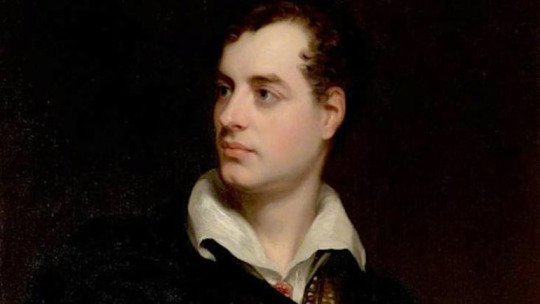
(Detail from Lord Byron, Thomas Phillips, 1813)
So... why Manfred? Why not Childe Harold's Pilgrimage, or The Corsair, or Don Juan, or any other work by Lord Byron? Well, I'll tell you why, my sweet summer children. It's because of THIS:
Manfred/Manfryds and Byrons in ASOIAF, by order of first appearance and publication:
Ser Manfred Swann (ASOS, Jaime VIII)
Ser Manfred Dondarrion (The Hedge Knight)
Manfred Lothston (The Sworn Sword)
Manfryd o' the Black Hood (AFFC, Brienne I)
Manfryd Yew (AFFC, Jaime V)
Ser Byron the Beautiful (AFFC, Alayne II, TWOW, Alayne I)
Ser Byron Swann (ADWD, Tyrion III)
Manfryd Merlyn of Kite (ADWD, Victarion I)
Manfryd Mooton, Lord of Maidenpool (The Princess and the Queen, TWOIAF)
Manfred Hightower, Lord of the Hightower (TWOIAF)
Manfred Hightower, Lord of the Hightower (Fire and Blood)
Like... what the hell, George?
I find this very interesting, very interesting indeed! *cough* intentional, very intentional *cough* And I have to thank @agentrouka-blog for reminding me of the existence of these Manfreds/Manfryds, and thus pointing me in this particular direction. This evidence is, for me, my smoking gun, it's why I feel justified in exploring this specific work. In my opinion, it really strongly confirms that GRRM is aware of Manfred, he is aware of its author — as a literary name, it is pretty much exclusively connected to Byron, it's like Hamlet to Shakespeare, or Heathcliff to Emily Brontë. In fact, GRRM likes it enough to use this name several times in fact, its frequency of use aided by a slight variation on its spelling.
So, as we can see, there are a striking number of Manfred/Manfryds (9!!) featured in the ASOIAF universe, whereas Byron (2) is used a bit more sparingly — perhaps because the latter, if more liberally used, would become far more recognisable as an overt literary reference? Interestingly, though, we can see a direct link between the two names as both bear the surname Swann: Ser Manfred Swann and Ser Byron Swann (note the exact spelling of Manfred here, as opposed to Manfryd). Ser Byron was alive during the Dance of Dragons and died trying to kill the dragon Syrax, whereas Ser Manfred was alive during Aegon V's reign and had a young Ser Barristan as his squire. So, in terms of ancestry, Byron came before Manfred, which makes sense since Lord Byron created the character of Manfred; he is his authorial/literary progenitor, if you will.
But why Swann, though? Is there any significance to that surname? Well, I did a little bit of digging and turned up something very interesting, at least in my opinion. In Percy Bysshe Shelley's poem Lines written among the Euganean Hills (1818), in its sixth stanza, the poet addresses the city of Venice... the “tempest-cleaving Swan” in the eighth line is clearly meant to be his friend and contemporary, Lord Byron, that city’s most famous expatriate:
That a tempest-cleaving Swan
Of the songs of Albion,
Driven from his ancestral streams
By the might of evil dreams,
Found a nest in thee;
(st. 6, l. 8-12)
Ah ha! But let's not forget that the Swanns are also a house from the stormlands — stormlander Swanns vs. "tempest-cleaving Swan." It seems a nice little homage, doesn't it? You could also argue that the battling swans of House Swann's sigil are a possible reference to Byron's fondness for boxing (he apparently received "pugilistic tuition" at a club in Bond Street, London). But to make the references to Byron too overt would ruin the subtly, so it isn't necessary, in my opinion, for the Swanns to be completely steeped in Byronisms.
All in all, it would be very neat of GRRM if the reasoning behind Byron and Manfred Swann is because of this reference to Lord Byron by Shelley. How these names and the characters that bear them might further reference Byron and Manfred is a possible discussion for another day! It's all just very interesting, very noteworthy, and highlights how careful GRRM is at choosing the names of his characters, even very minor, seemingly insignificant ones.
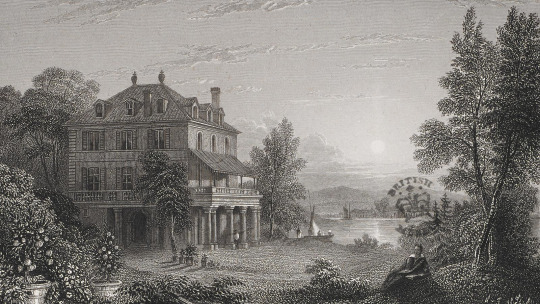
(Illustration of Villa Diodati from Finden's Illustrations of the Life and Works of Lord Byron, Edward Finden, 1833)
Now onto the actual poem, and the ways in which Jon Snow could being referencing/paralleling Manfred. First things first, a bit of biographical context. Take my hand, and let's travel back in time, way back when, to 1816, the year in which Lord Byron left England forever, his reputation in tatters due to the collapse of his marriage and the rumours of an affair with his half-sister, Augusta Leigh (plus he was hugely in debt). No doubt, most of us are familiar with the story, but in 1816 Byron travelled to Switzerland, to a villa on Lake Geneva, where he met the Shelleys and suggested that they all pass the time by writing ghost stories.
The most famous story produced by them was, of course, Mary Shelley's Frankenstein (1818) — which may have served as the partial inspiration behind Qyburn and Robert Strong! Byron himself did begin a story but soon gave it up (yesss, we love an unproductive king); it was completed, however, by his personal physician, John William Polidori, and eventually published, under Byron's name, as The Vampyre (1819). But Byron didn't completely abandon the ghost story project, as later that summer, after a visit by the Gothic novelist M. G. Lewis, he wrote his "supernatural" tragedy, Manfred (1817).*
*I've seen it dated as 1816-17, but the crucial thing to rememeber, in terms of Byron's own biography, is that unlike The Bride of Abydos, he wrote it after his departure from England... this theme of exile will come up later.
Manfred is what is called a "closet drama", so is structured much like a play, with acts and scenes, though it wouldn't have actually been intended to be performed on stage. Indeed, Lord Byron first described Manfred to his publisher as "a kind of poem in dialogue... but of a very wild—metaphysical—and inexplicable kind": "Almost all the persons—but two or three—are Spirits... the hero [is] a kind of magician who is tormented by a species of remorse—the cause of which is left half unexplained—he wanders about invoking these spirits—which appear to him—& are of no use—he at last goes to the very abode of the Evil principle in propria persona [i.e. in person]—to evocate a ghost—which appears—& gives him an ambiguous & disagreeable answer..."*
*As in Part 1, more academic references will be listed in a bibliography at the end of this post.
To sum up the narrative for you, Manfred is a nobleman living in the Bernese Alps, "tormented by a species of remorse", which is never fully explained, but is clearly connected to the death of his beloved Astarte. Through his mastery of poetic language and spell-casting, he is able to summon seven "spirits", from whom he seeks the gift of forgetfulness, but this plea cannot be granted — he cannot escape from his past. He is also prevented from escaping his mysterious guilt by taking his own life, but in the end, Manfred does die, thus defying religious temptations of redemption from sin. He therefore stands outside of societal expectations, a Romantic rebel who succeeds in challenging all of the authoritative powers he faces, ultimately choosing death over submission to the powerful spirits.
According to Lara Assaad, the character of Manfred is the "Byronic hero par excellence", as he shares its typical characteristics found in Byron's other work (as discussed in Part 1), "yet pushed to the extreme." As noted above, there is a defiance to Manfred's character, which is arguable also found in Jon. Certainly though, in all of Byron's works, the Byronic Hero appears as "a negative Romantic protagonist" to a certain extent, a being who is "filled with guilt, despair, and cosmic and social alienation," observes James B. Twitchell. I'll come back to those characteristics presently.
As noted by Assaad, "Byron scholars seem to agree on this definition of the Byronic Hero, however they focus mainly, if not exclusively, on the dynamics of guilt and remorse." Indeed, it is only in more recent years that the incest motif, as well as the influence of Byron's own biography, have been more widely discussed. But perhaps the most compelling aspect of the Byronic Hero is his complex psychology. Although trauma theory only really started to flourish during the 1990s, thus providing deeper insight into the symptoms that follow a traumatic experience, it nevertheless seems, at least to Assaad, that "Byron was familiar with it well before it was first discussed by professionals and diagnosed." As we know, GRRM began writing his series, A Song of Ice and Fire, during the 1990s, and character trauma and its effects feature heavily in his work, most notably in the case of Theon Greyjoy, but also in the memory editing of Sansa Stark in terms of the infamous "Unkiss".*
*The editing, or supressing, of memories is not exclusive to Sansa, however. E.g @agentrouka-blog has theorised a possible memory edit with regards to Tyrion and his first wife Tysha.
But if we return back to that original quote, in which GRRM makes the comparison between Jon and the Byronic Hero, his following statement is also very interesting:
The character I’m probably most like in real life is Samwell Tarly. Good old Sam. And the character I’d want to be? Well who wouldn’t want to be Jon Snow — the brooding, Byronic, romantic hero whom all the girls love. Theon [Greyjoy] is the one I’d fear becoming. Theon wants to be Jon Snow, but he can’t do it. He keeps making the wrong decisions. He keeps giving into his own selfish, worst impulses. [source]
As noted by @princess-in-a-tower, there is a close correspondence between Jon and Theon, with each acting as the other's foil in many respects. In fact, Theon does sort of tick off a few of the Byronic qualities I discussed last time, most notably standing apart from society, that "society" being the Starks in Winterfell, due to him essentially being a hostage. Later on, we see him develop a sense of deep misery as well due to his horrific treatment at the hands of Ramsey Snow. Like Theon, his narrative foil, Jon is also a character deeply informed by trauma (being raised a bastard), but the way they ultimately process and express that specific displacement trauma differs profoundly — Theon expresses it outwardly through his sacking of Winterfell, whereas Jon turns his trauma notably inwards.*
*Obviously, I'm not a medical professional — I'm more looking at this from a literary angle, but the articles I've read for this post do include reference to real medical definitions etc.
Previously, I observed how being "deeply jaded" and having "misery in his heart" were key characteristics of the Byronic Hero, as well as Jon Snow — this trauma theory is a continuation of that. Indeed, to bring it back to Manfred, Assaad goes as far as stating that the poem's titular hero "suffers from what is now widely recognised as post-traumatic stress disorder (PTSD)." I am purposely holding off on discussing what the origin of that trauma is, in relation to Manfred specifically, because, well... it needs a bit of forewarning before I get into it fully. Instead, let's look at the emotions it exacerabates or gives rise to, as detailed by Twitchell, and how they might be evident in Jon and his feelings regarding his bastard status.
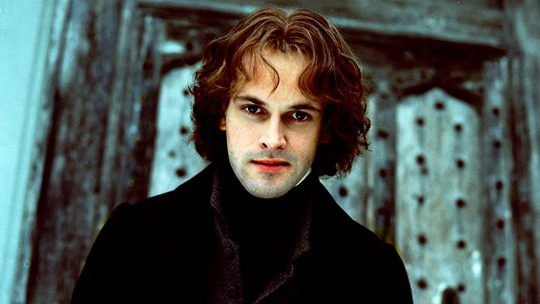
(Jonny Lee Miller as Byron in the two part BBC series Byron, 2003)
Guilt
Does Jon suffer guilt due to him being a bastard and secretly wanting to "steal" his siblings' birthright? I'd say a strong yes:
When Jon had been Bran's age, he had dreamed of doing great deeds, as boys always did. The details of his feats changed with every dreaming, but quite often he imagined saving his father's life. Afterward Lord Eddard would declare that Jon had proved himself a true Stark, and place Ice in his hand. Even then he had known it was only a child's folly; no bastard could ever hope to wield a father's sword. Even the memory shamed him. What kind of man stole his own brother's birthright? I have no right to this, he thought, no more than to Ice. – AGOT, Jon VIII
He wanted it, Jon knew then. He wanted it as much as he had ever wanted anything. I have always wanted it, he thought, guiltily. May the gods forgive me. – ASOS, Jon XII
But I think Jon's sense of guilt also extends to the high expectations he sets for himself, his "moral superiority" in the face of his bastard status, as discussed in Part 1. He feels guilt pulling him in two different directions, in regards to Ygritte: guilt for loving her, for breaking his vows, and potentially risking a bastard, but also guilt for leaving her, for abandoning her, and potentially leaving her unprotected:
His guilt came back afterward, but weaker than before. If this is so wrong, he wondered, why did the gods make it feel so good? – ASOS, Jon III
Ygritte was much in his thoughts as well. He remembered the smell of her hair, the warmth of her body... and the look on her face as she slit the old man's throat. You were wrong to love her, a voice whispered. You were wrong to leave her, a different voice insisted. He wondered if his father had been torn the same way, when he'd left Jon's mother to return to Lady Catelyn. He was pledged to Lady Stark, and I am pledged to the Night's Watch. – ASOS, Jon VI
"I broke my vows with her. I never meant to, but..." It was wrong. Wrong to love her, wrong to leave her..."I wasn't strong enough. The Halfhand commanded me, ride with them, watch, I must not balk, I..." His head felt as if it were packed with wet wool. – ASOS, Jon VI
This guilt surrounding leaving the women/girls he cares about unprotected also extends to Arya. Yet it was his need to prove himself as something more than just a bastard, by joining the Watch, which initially prevents him from acting, and which also makes him feel guilt for being a hyprocrite:
Jon felt as stiff as a man of sixty years. Dark dreams, he thought, and guilt. His thoughts kept returning to Arya. There is no way I can help her. I put all kin aside when I said my words. If one of my men told me his sister was in peril, I would tell him that was no concern of his. Once a man had said the words his blood was black. Black as a bastard's heart. – ADWD, Jon VI
I think there is a lack of reconciliation between Jon and his bastard status, between what being a bastard implies in their society: lustful, deceitful, treacherous, more "worldly" etc. Deep down, subconsciously, Jon really rebels against it. You can see that rebellion more clearly in his memories as a younger child, less inhibited:
Every morning they had trained together, since they were big enough to walk; Snow and Stark, spinning and slashing about the wards of Winterfell, shouting and laughing, sometimes crying when there was no one else to see. They were not little boys when they fought, but knights and mighty heroes. "I'm Prince Aemon the Dragonknight," Jon would call out, and Robb would shout back, "Well, I'm Florian the Fool." Or Robb would say, "I'm the Young Dragon," and Jon would reply, "I'm Ser Ryam Redwyne."
That morning he called it first. "I'm Lord of Winterfell!" he cried, as he had a hundred times before. Only this time, this time, Robb had answered, "You can't be Lord of Winterfell, you're bastard-born. My lady mother says you can't ever be the Lord of Winterfell."
I thought I had forgotten that. Jon could taste blood in his mouth, from the blow he'd taken. – ASOS, Jon XII
But Jon knows this truth about himself, he knows that he has "always wanted it", and that causes him so much guilt because he can't allow himself to be selfish in that regard, because to do so would confirm for him his worst fears... that he truly is a bastard in nature as well as birth — treacherous, covetous, dishonourable.
Despair
As he grows up, learning to curb his emotional outbursts from AGOT, Jon appears more and more stoic upon the surface. But beneath that, buried in his subconscious in the form of dreams, you have this undyling feeling of despair, this trauma connected to his bastard status, his partially unknown heritage:
Not my mother, Jon thought stubbornly. He knew nothing of his mother; Eddard Stark would not talk of her. Yet he dreamed of her at times, so often that he could almost see her face. In his dreams, she was beautiful, and highborn, and her eyes were kind. – AGOT, Jon III
These recurring dreams, sometimes explicitly involving his unknown mother, sometimes not, represent a clear gap, a gaping blank in Jon's personal history and his perception of his identity:
"Sometimes I dream about it," he said. "I'm walking down this long empty hall. My voice echoes all around, but no one answers, so I walk faster, opening doors, shouting names. I don't even know who I'm looking for. Most nights it's my father, but sometimes it's Robb instead, or my little sister Arya, or my uncle." [...]
"Do you ever find anyone in your dream?" Sam asked.
Jon shook his head. "No one. The castle is always empty." He had never told anyone of the dream, and he did not understand why he was telling Sam now, yet somehow it felt good to talk of it. "Even the ravens are gone from the rookery, and the stables are full of bones. That always scares me. I start to run then, throwing open doors, climbing the tower three steps at a time, screaming for someone, for anyone. And then I find myself in front of the door to the crypts. It's black inside, and I can see the steps spiraling down. Somehow I know I have to go down there, but I don't want to. I'm afraid of what might be waiting for me. The old Kings of Winter are down there, sitting on their thrones with stone wolves at their feet and iron swords across their laps, but it's not them I'm afraid of. I scream that I'm not a Stark, that this isn't my place, but it's no good, I have to go anyway, so I start down, feeling the walls as I descend, with no torch to light the way. It gets darker and darker, until I want to scream." He stopped, frowning, embarrassed. "That's when I always wake." His skin cold and clammy, shivering in the darkness of his cell. Ghost would leap up beside him, his warmth as comforting as daybreak. He would go back to sleep with his face pressed into the direwolf's shaggy white fur. – AGOT, Jon IV
"That always scares me", he says quite tellingly. From this key passage, in particular, we can see that Jon feels a deep rooted despair at essentially being unclaimed, unwanted... being without a solid (Stark) identity around which to draw strength and mould himself. He's afraid of being a lone wolf, because as we all know, "the lone wolf dies, but the pack survives," (AGOT, Arya II).
This dream points him in the direction of the crypts — "somehow I know I have to go down there, but I don't want to" — which actually does have the answers he seeks because that is where Lyanna Stark is buried. Yet Jon is "afraid of what might be waiting for [him]", and wants to "scream" with dispair because of the darkness. So, this need for a confirmed identity is a double edged sword, which will no doubt be further complicated when his true parentage is revealed.
Elsewhere, Jon's dreams continue to have this despairing quality to them, often involving Winterfell, the Starks, and especially Ned, which is very interesting on a psychological level:
The grey walls of Winterfell might still haunt his dreams, but Castle Black was his life now, and his brothers were Sam and Grenn and Halder and Pyp and the other cast-outs who wore the black of the Night's Watch. – AGOT, Jon IV
Last night he had dreamt the Winterfell dream again. He was wandering the empty castle, searching for his father, descending into the crypts. Only this time the dream had gone further than before. In the dark he'd heard the scrape of stone on stone. When he turned he saw that the vaults were opening, one after the other. As the dead kings came stumbling from their cold black graves, Jon had woken in pitch-dark, his heart hammering. Even when Ghost leapt up on the bed to nuzzle at his face, he could not shake his deep sense of terror. He dared not go back to sleep. Instead he had climbed the Wall and walked, restless, until he saw the light of the dawn off to the east. It was only a dream. I am a brother of the Night's Watch now, not a frightened boy. – AGOT, Jon VII
But it is never "only a dream", is it?
And when at last he did sleep, he dreamt, and that was even worse. In the dream, the corpse he fought had blue eyes, black hands, and his father's face, but he dared not tell Mormont that. – AGOT, Jon VIII
Even Jon's conscious daydreams in AGOT revolve around his dispairing search for a solid identity:
When Jon had been Bran's age, he had dreamed of doing great deeds, as boys always did. The details of his feats changed with every dreaming, but quite often he imagined saving his father's life. Afterward Lord Eddard would declare that Jon had proved himself a true Stark, and place Ice in his hand. Even then he had known it was only a child's folly; no bastard could ever hope to wield a father's sword. Even the memory shamed him. What kind of man stole his own brother's birthright? I have no right to this, he thought, no more than to Ice. – AGOT, Jon VIII
A lot of these early dreams occur in A Game of Thrones, probably in response to his removal from Winterfell... his self exile. But later on in the series Jon continues to have dreams that tie him to the Starks and to Winterfell, ominous and sometimes despairing too. There's honestly too many instances to list, but if you want to understand the root of Jon's existential despair... it's in his dreams.
Cosmic Alienation
Cosmic alienation, now that's an interesting one in regards to Jon, since he definitely hasn't reached this state... yet. Life and his belief in the divine (the old gods) still hold meaning for him, but then he gets murdered by his black brothers. In the show, the writers hint at some cosmic alienation through Jon stating that he saw "nothing" whilst dead, but then they take it no further and generally do a piss poor job of post-res Jon. This characteristic of Manfred coming to the fore in Jon depends on what happens in The Winds of Winter, but I don't think it is at all that far fetched to assume that Jon will return to his body with a darker, altered perception of things.
Social Alienation
In Part 1, I discussed how Jon, like Byron's heroes, could be read as a "a rebel who stands apart from society and societal expectations." On a more psychological level, we can see how this Otherness, stemming from his bastard status, deeply affects Jon and his perception of himself and the world:
Benjen Stark gave Jon a long look. "Don't you usually eat at table with your brothers?"
"Most times," Jon answered in a flat voice. "But tonight Lady Stark thought it might give insult to the royal family to seat a bastard among them." – AGOT, Jon I
In his very first chapter, we see him quite literally alienated from the rest of his siblings, made to sit apart from them, an apparent necessity he seems fairly resigned to. Also in Part 1, I gave examples of instances in which Jon is mockingly called "Lord Snow," as well as a "rebel", "turncloak", "half-wildling", all of which serve to alienate him from the rest of the brothers of the Night's Watch.
Stannis gave a curt nod. "Your father was a man of honor. He was no friend to me, but I saw his worth. Your brother was a rebel and a traitor who meant to steal half my kingdom, but no man can question his courage. What of you?" – ASOS, Jon XI
The above interaction may seem on the surface to be about one thing — whether or not Jon will be of help to Stannis, offer him loyalty etc. — but tagged onto the end we have quite a poignant question: "what of you?" What are you, essentially. Who are you? The truth of his parentage may, in part, solve these questions... but it may also serve to alienate Jon from his perception of himself further. Ultimately, who exactly he is — what he believes in, who and what he fights for, etc. — will be solely his decision to make going forward.
So, the Byronic Hero, certainly in Manfred's case, but also in later iterations, is arguably traumatised by his own past. But regardless as to whether his trauma is related to a mysterious past, a secret sin, an unnamed crime, or incest, aka "secret knowledge", what is clear in Assaad's interpretation, is that the Byronic Hero is "living with the traumatic consequences of his own past and so suffers from PTSD." But why is Manfred traumatised, what is the specific cause of this trauma, or how might it reveal something deeper about Jon's own trauma? Now, here we come to the unavoidable... I'm going to start talking about Byronic incest and the pre-canon crush/kiss theory, and how it potentially parallels certain aspects of Manfred.
I should preface this by stating that I don't think Jon is suppressing trauma because he committed intentional incest with Sansa, but I do think (or at least somewhat theorise that) Byronic incest does come into play regarding his intense feelings of guilt and existential despair.
But still, stop reading now if are opposed to discussions of the pre-canon crush/kiss theory and the literary incest motif as a whole!
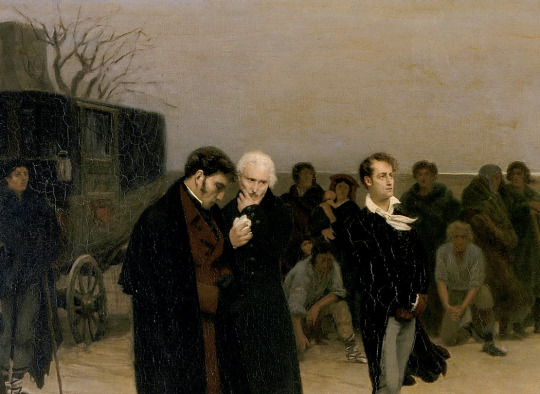
(Detail from The Funeral of Shelley, Louis Édouard Fournier, 1889)
Hey there to the depraved! If you aren't already familiar with the theory, here are some previous discussions/metas on the subject:
Full Blown Meta:
A Hidden and Forbidden Love by @princess-in-a-tower
Ask Answers (Long):
Jonsa as a more positive mirror to Jaime and Cersei? by @princess-in-a-tower, with additional comment by @jonsameta
Discussing the theory by @jonsameta
Evidence for pre-canon Jonsa? by @agentrouka-blog
Kissing in the godswood? by @agentrouka-blog
Why don't we read about Jon's reaction to Sansa and Tyrion? by @agentrouka-blog
More on Jon's supposed non-reaction by @agentrouka-blog, with additional comment made by @sherlokiness
A Jonsa "Unkiss"? by @fedonciadale
A hidden memory? by @fedonciadale
Sansa's misremembering by @fedonciadale
Descriptive parallels between A Song for Lya and Jonsa by @butterflies-dragons
Ask Answers (Short) & Briefer Mentions:
Jealous Jon by @princess-in-a-tower
Your new boyfriend looks like a girl by @butterflies-dragons
Like in Part 1, I've tried to cite as much as I could find, but as always, if anyone feels like I've missed someone important or that they should be included in the above list, please just drop me a line!
Now, it's a controversial theory, and not everyone's cup of tea — I think that's worth acknowledging! I myself am not wholly married to it, I'd be fine if it wasn't the case, but that being said, I can't in good faith ignore it when considering Lord Byron and the Byronic Hero. The incest is, unfortunately, very hard to ignore, both in his work and in his personal life. It's pretty hard to ignore in Manfred, for that matter, which is why I've held off talking about it... until now!
All aboard the Manfred incest train *choo choo* !!
First stop, Act II, scene one. Oh, wait, an annoucement from your conductor... apologies everyone, I purposely neglected to mention quite a key detail. Remember "Astarte! [Manfred's] beloved!", (II, iv, 136)? Yeah... it's heavily implied that Astarte is in fact Manfred's half-sister. *shoots finger guns* Classic Byron! *facepalms*
Oh, and that's not all! Let's consider the context surrounding the writing of this work for a moment, shall we? Unlike The Bride of Abydos (1813),* Manfred was written notably after the fallout of his incestuous affair with his half-sister, Augusta Leigh, composed whilst in a self-imposed exile. *spits out drink* Woah, woah there cowboy... what in tarnation?! EXILE?!
*As referenced in Part 1, @rose-of-red-lake has written an excellent meta on the influence of Lord Byron's work (and personal life) on Jonsa, paying special attention to the half-siblings turned cousins in The Bride of Abydos.
Although, as noted by rose-of-red-lake, The Bride of Abydos bears strong parallels to the potential romance of Jon and Sansa, as well as Byron’s own angst regarding his relationship with Augusta Leigh, the context surrounding Manfred seems... dare I say it, even more autobiographical. Because like Byron himself, Manfred wanders around the Bernese Alps, solitary and guilt ridden, in a state of exile heavily evocative of Byron's own — as I mentioned earlier, the beginnings of Manfred occured whilst Byron was staying at a villa on Lake Geneva, in Switzerland... the Bernese Alps are located in western Switzerland. In light of this, I think it's very understandable that some critics consider Manfred to be autobiographical, or even confessional. The unnamed but forbidden nature of Manfred's relationship to Astarte is believed to represent Byron's relationship with his half-sister Augusta. But what has that got to do with Jon?
Look, I don't know how else to put this:
Byron self-exiles in 1816, first to Switzerland, to Lake Geneva, where it is unseasonably cold and stormy — his departure from England is due to the collaspe of his marriage to Annabella Milbanke, unquestionably as a result of the rumours surrounding his incestuous affair with his half-sister.
Displaced nobleman Manfred wanders the Bernese Alps, in a kind of moral exile, where "the wind / Was faint and gusty, and the mountain snows / Began to glitter with the climbing moon" (III, iii, 46-48), traversing "on snows, where never human foot / Of common mortal trod" (II, iii, 4-5), surrounded by a "glassy ocean of the mountain ice" (II, iii, 7). He feels extreme, but unexplained guilt surrounding the death of his "beloved" Astarte, who is heavily implied to also be his half-sister.
In A Game of Thrones, Jon Snow chooses to join the Night's Watch, with the reminder that "once you have taken the black, there is no turning back" (AGOT, Jon VI). By taking the black, Jon arguably exiles himself from the rest of the Starks, from Winterfell, to a place that "looked like nothing more than a handful of toy blocks scattered on the snow, beneath the vast wall of ice" (AGOT, Jon III). But we aren't given any indication that he does this due to incestuous feelings regarding a "radiant" half-sister, akin to Byron/Manfred, are we? And it's not like we have several Manfreds/Manfryds AND Byrons namedropped within the text, is it? Oh wait... we do. *grabs GRRM in a chokehold*
What the hell, George?!
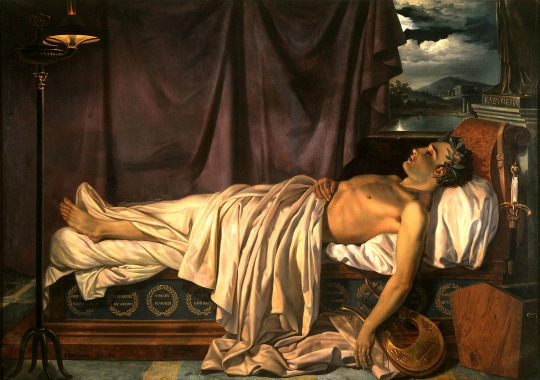
(Lord Byron on His Deathbed, Joseph Denis Odevaere, c. 1826)
But lets get back on track here and take a closer look at that section of Manfred I mentioned at the beginning — Act II, scene one, aka the part where all the incest and supressed trauma really JUMPS out.
So, early in Act II, in the chamois hunter's abode (a chamois is a type of goat?), according Assaad's analysis, Manfred is "hyper-aroused by a cup of wine." The wine is offered in an attempt to calm Manfred; however, to the chamois hunter's great dismay, it instead agitates him and makes him utter words which are "strange" (II, i, 35). Rather than wine, Manfred sees "blood on the brim" (II, i, 25). His sudden agitation and erratic behaviour confound the chamois hunter, who observes that Manfred is losing his mind: "thy senses wander from thee" (II, i, 27). Assaad's analysis of this scene, which she believes "is the most revelatory in the entire play" discloses "a bitter truth: Manfred's traumatic past informs his present life."
We might compare this with Jon, in particular, how his dreams reveal certain bitter truths to do with his past, now subconsciously informing his present. I've already looked a bit at his crypt dream from AGOT, Jon IV, but we see a sort of recurrence of this dream again in ASOS, Jon VIII. The imagery of being in a crypt, somewhere underground, buried, in the dark, a place of ghosts and spirits, is extremely evocative. Indeed, to go back to Byron's own description of Manfred, the setting of a crypt is extremely suggestive of certain bitter truths "left half unexplained", of secrets buried... and we know that's true because the secret of Jon's parentage is hidden down there, in the form of Lyanna Stark.
He dreamt he was back in Winterfell, limping past the stone kings on their thrones. Their grey granite eyes turned to follow him as he passed, and their grey granite fingers tightened on the hilts of the rusted swords upon their laps. You are no Stark, he could hear them mutter, in heavy granite voices. There is no place for you here. Go away. He walked deeper into the darkness. "Father?" he called. "Bran? Rickon?" No one answered. A chill wind was blowing on his neck. "Uncle?" he called. "Uncle Benjen? Father? Please, Father, help me." Up above he heard drums. They are feasting in the Great Hall, but I am not welcome there. I am no Stark, and this is not my place. His crutch slipped and he fell to his knees. The crypts were growing darker. A light has gone out somewhere. "Ygritte?" he whispered. "Forgive me. Please." But it was only a direwolf, grey and ghastly, spotted with blood, his golden eyes shining sadly through the dark... – ASOS, Jon VIII
I don't think it's outlandish to state that, unquestionably, Jon's bastard identity is a source of ongoing pain for him. I talked about the theme of despair in Jon's characterisation and it is very evident in the above, and it stems from this "bitter truth" of not being a trueborn Stark, of not being "welcome", or having a true place. The emotions/mindset this trauma, concerning his birth and identity, evokes in Jon is arguably what brings him, on first glance, so closely in line with the Byronic Hero:
Their grey granite eyes turned to follow him as he passed / The crypts were growing darker = A mysterious past / secret sin(s)
You are no Stark / I am no Stark = Deeply jaded
There is no place for you here / I am not welcome there / This is not my place = standing apart from society and societal expectations / social alienation
He dreamt he was back in Winterfell / He walked deeper into the darkness = Moody / misery in his heart
He fell to his knees / Forgive me = Guilt
He walked deeper into the darkness / Please, Father, help me / He fell to his knees = Despair
These aren't all the Byronic characteristics I've addressed in relation to Jon, but it is a substantial percentage of them, all encapsulated, in one way or another, within this singular dream passage. As far as what is fairly explicit in the text, being a bastard is Jon's "bitter truth", it is the "traumatic past inform[ing] his present life." But what is Manfred's "bitter truth", what past trauma is informing his present? And can it reveal a bit more about another layer to Jon's trauma? Because there is a key distinction — Manfred's trauma, his PTSD, stems from a specific event, notably triggered by the (imagined) "blood on the brim" of his wine, whereas for Jon, we have no singular event, we have no momentus experience, we just have this "truth."
As mentioned previously, Assaad has recognised the character of Manfred as displaying symptoms of post-traumatic stress disorder (PTSD). In Assaad's article, she remarks that "an experience is denoted as traumatic if it completely overwhelms the individual, rendering him or her helpless," and this is quite evident in the interaction between Manfred and the chamois hunter. Sharon Stanley, an educator and clinical psychotherapist, writes that "the word trauma has been used to describe a variety of aversive, overwhelming experiences with long-term, destructive effects on individuals and communities."
So, if trauma is related to an experience, or experiences, is it still accurate to say that Jon experiences trauma, connected to being a bastard? Because there is seemingly no singular or defining root experience, or event that it stems from, it just is… it is a compellation of several moments, revealed to the reader through Jon’s memories and/or dreams. What is being "left half unexplained” here?
Assaad makes reference to the American Psychiatric Association's definition of PTSD, in which it observes that for an individual to be diagnosed with PTSD, they have to suffer from one or more intrustion symptoms, one or more avoidance symptoms, two or more negative alterations, and two or more hyperarousal symptoms. The dreams Jon has certainly suggest something, but it seems like a stretch to say that, like Manfred, he is suffering from PTSD, right? We and Jon are very much aware that he is "no Stark", at least not in the sense that he is Ned's trueborn son, this isn’t something Jon is actively suppressing. By comparison, it is incontrovertible that Manfred committed something in the past, which he deeply wishes to forget and disassociate from:
Man. I say ’tis blood—my blood! the pure warm stream
Which ran in the veins of my fathers, and in ours
When we were in our youth, and had one heart,
And loved each other as we should not love,
And this was shed: but still it rises up,
Colouring the clouds, that shut me out from heaven,
Where thou art not—and I shall never be.
C. Hun. Man of strange words, and some half—maddening sin
(II, i, 28-35)
However, we cannot be sure what this traumatic point of origin is, though we know that it is related to something he has done to his beloved Astarte, which subsequently led to her death. Many critics have suggested that his sin is that of incest, and as I noted earlier, that Manfred as a whole is more than just a bit autobiographical and/or confessional in nature. Manfred's incestuous sin therefore re-enacts Byron's incest with his half-sister Augusta. But regardless of the true cause, Manfred is traumatised by his past and cannot overcome it. Is there something in Jon’s past, that may have subconsciously, or consciously, influenced his departure to the Wall — his self exile — which he cannot overcome, and which is closely tied to the issue of and pain he feels due to being a bastard, not just the illegitimacy, but also the negative characteristics it assigns? Is there an event, or experience, we can pinpoint as the origin of Jon’s trauma and potential PTSD?
To circle back to Jonsa, there is some, not unfounded, debate amongst us concerning the validity of the pre-canon crush/kiss theory. I've always found it an interesting theory, but until now, I haven't really given it too much thought. In light of the Byron connection, however, as well as the textual analysis I have for Part 3, I think this scenario, as detailed by agentrouka-blog, seems more and more likely. And I don't say that lightly, I really don't. It is a somewhat uncomfortable speculation to make, even if the interaction was more innocent rather than explicit (this is the side I firmly fall down on), however, it’s ambiguity does potentially parallel Byron’s Manfred and Astarte. This post would be even longer if I included my side-by-side text comparisons, so you may have to trust me for the moment that there are some very striking similarities between Act II, scene I of Manfred, and Jon's milk of the poppy induced dream in ASOS, Jon VI, as well as the actual buildup to that vision.
But, that sounds frankly terrible doesn't it? And it doesn't bode well for his future relationship with Sansa, does it? And what does it mean if Jon is suffering from PTSD due to an incestuous encounter with Sansa? What does that mean for Sansa, Sansa who is doggedly abused and mistreated by men within the present narrative? This is awful, why would GRRM root their romance in something traumatic? Oh I hear you, and these are questions I needed to ask myself whilst compiling this. But you see... now bear with me here... it isn't the actual encounter itself that was traumatic, for either Jon or Sansa, and that is reflected in both their POVs, because, though they think about each other sparingly (explicitly at least), it is never done so negatively. No, the potential PTSD Jon suffers from this experience isn't connected to Sansa, to whatever occured between them. Rather, I believe, it's connected to either the fear, or the reality, that Ned, his assumed father, saw and/or caught him (either Sansa had left at this point, or didn't fully grasp the issue), and this fear, this guilt, this sense of despair, is made evident in this passage:
When the dreams took him, he found himself back home once more, splashing in the hot pools beneath a huge white weirwood that had his father’s face. Ygritte was with him, laughing at him, shedding her skins till she was naked as her name day, trying to kiss him, but he couldn’t, not with his father watching. He was the blood of Winterfell, a man of the Night’s Watch. I will not father a bastard, he told her. I will not. I will not. “You know nothing, Jon Snow,” she whispered, her skin dissolving in the hot water, the flesh beneath sloughing off her bones until only skull and skeleton remained, and the pool bubbled thick and red. – ASOS, Jon VI
That's the traumatic experience, I believe, not the kiss — yep, I strongly suspect there was a kiss. Moreover, Jon's recurring assertion, throughout the series, that he "will not father a bastard" is tied to this in some way, it’s tied to Ned, it’s tied to some sense of guilt and shame. It’s not tied to Sansa. But we'll look at this passage, what it means, what it parallels, and what directly precedes it, in comparison to Manfred, a lot more closely next time.
I'll leave you with a slight teaser though — the parallel that made me really sit up and take notice:
C. Hun. Well, sir, pardon me the question,
And be of better cheer. Come, taste my wine;
'Tis of an ancient vintage; many a day
'T has thaw’d my veins among our glaciers, now
Let it do thus for thine. Come, pledge me fairly.
Man. Away, away! there’s blood upon the brim!
Will it then never—never sink in the earth?
(II, i, 21-26)
Note this imagery!!!
Maester Aemon poured it full. "Drink this."
Jon had bitten his lip in his struggles. He could taste blood mingled with the thick, chalky potion. It was all he could do not to retch it back up. – ASOS, Jon VI
In both instances, a drink is offered, with "blood upon the brim", and "blood mingled". In Manfred's case, this is an explicit trigger for him, whereas for Jon? Well, it bit more hidden, a bit more buried, but this moment is, to my mind, the catalyst, because its imagery strongly evokes the colours of the weirwood tree — "blood" red and "chalky" white — you know, the "huge white weirwood" he later on envisions.
*spits out drink*
Maybe the magnitude of this parallel isn't completely evident as of yet, but it will be... or at least I hope it will be, so stay tuned for Part 3!
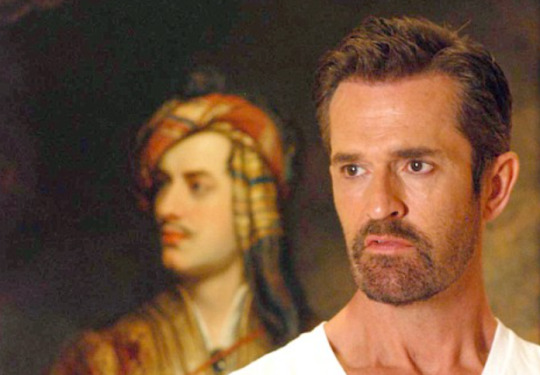
(Starting to run out of Byron pics so... I dunno, here's Rupert Everret, from The Scandalous Adventures of Lord Byron, 2009)
In Conclusion
To summarise, why is the Manfred connection so monumental to me? Why do I find the pre-canon kiss theory, specifically the scenario detailed by agentrouka-blog, now very hard to dismiss? Because:
The nine (!) Manfreds/Manfryds included within the text, as well as the two Byrons, one of which, the first mentioned in fact, first appears in Sansa's POV. But crucicially the direct link made by GRRM between Byron Swann and Manfred Swann.
The strength of the similarities that can be observed between Jon and the Byronic Hero, but also notably to Byron's Manfred, the "Byronic hero par excellence", according to Assaad. Especially the recurring emotions of guilt and despair, the latter exemplified perhaps most clearly in Jon's dreams.
The prominent theme of self-exile to escape something, something that perhaps cannot be openly stated, present in Manfred, Byron's own life, and Jon's narrative.
Those pesky half-sisters: Augusta, Astarte, and Sansa.
The PTSD symptoms clearly present in Manfred, but left "half unexplained", and seemingly not explained at all in Jon's POV — I'll dig more into this in Part 3.
The "blood upon the brim", and "blood mingled" — more on that in Part 3, I hope you guys like in depth imagery analysis!
Obviously, this is all still just speculation on my part, and it's speculation in connection to a theory that is understandably controversial. I'd be happy to dismiss it... if it weren't for the above. So, I suppose I'm in two minds about it. On the one hand, however you look at it, it's more trauma in an already traumatic series... which is *sighs* not what you want for the characters you care strongly about. But on the other hand, that literary connection to Manfred (and by extension to actual Lord Byron), the way it's lining up, plus that comparison GRRM himself made between Jon and the Byronic Hero... that's all very compelling and interesting to me as a reader, as a former English literature student. So, I don't want it to be true because... incest hell. But then, I also want it to be true because then it makes me feel smart for guessing correctly.
But anyway, we're going to be descending into incest hell in Part 3, so... we'll just have to grapple with that when we come to it. I hope, if you stuck with it till the incesty end, that you enjoyed this post!
Stay tuned ;)
Bibliography of Academic Sources:
American Psychiatric Association, Diagnostic and Statistical Manual of Mental Disorders, 5th edn (Arlington, VA: American Psychiatric Publishing, 2013); online edition at www.dsm5.org
Assaad, Lara, "'My slumbers—if I slumber—are not sleep': The Byronic Hero’s Post-Traumatic Stress Disorder", The Byron Journal 47, no. 2 (2019): 153–163.
Byron, George Gordon Noel, Byron’s Letters and Journals. Ed. Leslie A. Marchand. 12 vols. London: Murray, 1973–82.
Holland, Tom, "Undead Byron", in Byromania: Portraits of the Artist in Nineteenth- and Twentieth- Century Culture, ed. by Frances Wilson (Basingstoke: Palgrave, 2000).
MacDonald, D. L. "Narcissism and Demonality in Byron’s 'Manfred'", Mosaic: An Interdisciplinary Critical Journal 25, no. 2 (1992): 25–38.
Stanley, Sharon, Relational and Body-Centered Practices for Healing Trauma: Lifting the Burdens of the Past (London: Routledge, 2016)
Twitchell, James B., The Living Dead: A Study of the Vampire in Romantic Literature (Durham, NC: Duke University Press, 1981).
#jonsa#jon x sansa#jonsa meta#jon as the byronic hero#byronic hero#lord byron#tw: incest#cappy's thoughts#grrm and the Romantics#Jonsa and Romanticism#percy bysshe shelley#romantic poets#literary references#damn this was a long one!#glad a split it into another part!#i started to get a bit unhinged by the end not gonna lie
97 notes
·
View notes
Text
let's talk about andi mack's worldbuilding
sorry this took forever to make! i've been pretty busy with school stuff and i kind of lost my inspiration for a bit, but i ultimately really enjoyed writing it! i wish i could've included more pics (tumblr has a max of 10 per post), and it kinda turned from less of a mini analysis to more of an extremely long rant... but i hope it's still a fun read!
i've been rewatching the show over the past few weeks (thanks again to @disneymack for the link!), and i’ve been noticing a lot that i never did the first time around. this is really the first time i’ve watched the show from start to finish since it aired, and it honestly feels so different this time - probably a combination of the fact that i’m not as focused on plot and can appreciate the show as a whole, and also that the fandom is much, much smaller now, so there’s a lot less noise. so the way i’m consuming this show feels super different than it did the first time, but the show itself doesn’t - it’s just as warm and comforting to me as it was the first time around, if not more so.
i think a lot of that can be attributed to andi mack’s “worldbuilding”. i’m not quite sure that this is the right word in this context, to be honest, because i mostly see it used in reference to fantasy and sci-fi universes, but it just sort of feels right to me for andi mack, because you can really tell how much love and care went into constructing this universe. for clarity, worldbuilding is “the process of creating an imaginary world” in its simplest sense. there’s two main types: hard worldbuilding, which involves inventing entire universes, languages, people, cultures, places, foods, etc. from scratch (think “lord of the rings” or “dune”), and soft worldbuilding, in which the creators don’t explicitly state or explain much about the fictional universe, but rather let it’s nature reveal itself as the story progresses (think studio ghibli films). andi mack to me falls in the soft worldbuilding category. even though it takes place in a realistic fiction universe, there’s a lot of aspects to it that are inexplicably novel in really subtle ways.
so watching the show now, i’ve noticed that the worldbuilding comes primarily from two things - setting and props, and oftentimes the both of them in tandem (because a big part of setting in filmmaking does depend on the props placed in it!).
one of the most obvious examples is the spoon. it really is a sort of quintessential, tropic setting in that it's the main gang's "spot", which automatically gives it a warm and homey feel to it. and its set design only amplifies this:
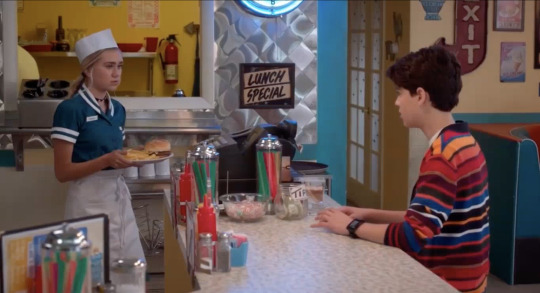
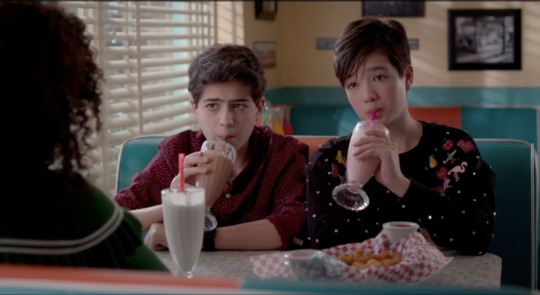
the choice to make it a very traditional 50s-style diner creates a very nostalgic, retro feel to it, which is something that's really consistent throughout the show, as you'll see. from the round stools at the bar, to the booths, to the staff uniforms, this is very obvious. the thing that i found especially interesting about it though is the choice of color. the typical 50s diner is outfitted with metallic surfaces and red accented furnishings, but the spoon is very distinctly not this.
instead, it's dressed in vibrant teal and orange, giving it a very fresh and modern take on a classic look. so it still maintains that feeling of being funky and retro, but that doesn't retract from the fact that the show is set distinctly in modern times.
of course, this could just be a one-off quirky set piece, but this idea of modernizing and novelizing "retro" things is a really common motif throughout the show. take red rooster records. i mean, it's a record shop - need i say more? it's obviously a very prominent store in shadyside, at least for the main characters, but there's no apparent reason why it is (until season 2 when bowie starts working there, and jonah starts performing there). a lot of the time, though, it functions solely as a record shop. vinyl obviously isn't the most practical or convenient way of listening to music, but it's had its resurgence in pop culture even in the real world, mostly due to its aesthetic value, so it's safe to say that it serves the same purpose in the andi mack universe.

the fringe seems to be nostalgic of a different era, specifically the Y2K/early 2000s period (because it's meant to be bex's territory and symbolic of who she used to be, and its later transformation into cloud 10 is representative of her character arc, but that's beside the point). to be honest, exactly what this store was supposed to be always confused me. it was kind of a combination party store/clothing store/makeup store/beauty parlor? i think that's sort of the point of it though, it's supposed to feel very grunge-y and chaotic (within the confines of a relatively mellow-toned show, of course), and it's supposed to act as a sort of treasure chest of little curios that both make the place interesting and allow the characters to interact with it.
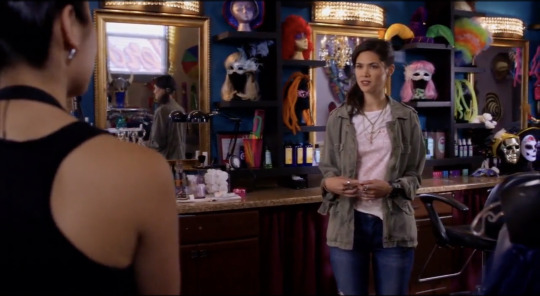
and, of course, there's andi shack. this is really the cherry on top of all of andi mack's sets, just because it's so distinctly andi. it serves such amazing narrative purpose for her (ex. the storyline where cece and ham were going to move - i really loved this because it highlights its place in the andi mack universe so well, and i'm a sucker for the paper cranes shot + i'm still salty that sadie's cranes didn't make it into the finale) and it's the perfect reflection of andi's character development because of how dynamic it is (the crafts and art supplies can get moved around or switched out, and there's always new creations visible).
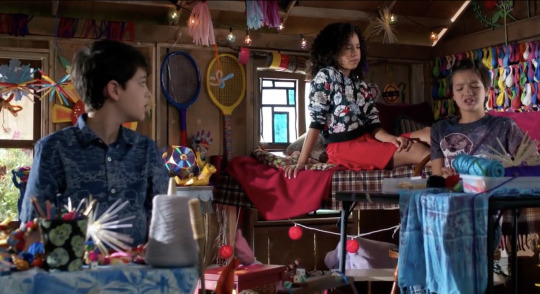
going back to the nostalgia motif though, the "shack" aspect of it always struck me as very treehouse-like. personally, whenever i think of treehouses, there's this very golden sheen of childhood about it, if that makes sense. i've always seen treehouses in media as a sort of shelter for characters' youthful innocence and idealistic memories. for example, the episode "up a tree" from good luck charlie, the episode "treehouse" from modern family, and "to all the boys 2" all use a treehouse setting as a device to explore the character's desire to hold onto their perfect image of their childhood (side note: this exact theme is actually explored in andi mack in the episode "perfect day 2.0"!). andi shack is no exception to this, but it harnesses this childhood idealism in the same way that it captures the nostalgia of the 50s in the spoon, or the early 2000s in the fringe. it's not some image of a distant past being reflected through that setting; it's very present, and very alive, because it reflects andi as she is in the given moment.
some honorable mentions of more one-off settings include the ferris wheel (from "the snorpion"), the alley art gallery (from "a walker to remember"), SAVA, the color factory (from "it's a dilemna"), and my personal favorite, the cake shop (from "that syncing feeling").

[every time i watch this episode i want to eat those cakes so bad]
these settings have less of a distinctly nostalgic feel (especially the color factory, which is a very late 2010s, instagram era setting), but they all definitely have an aura of perfection about them. andi mack is all about bright, colorful visuals, and these settings really play to that, making the andi mack universe seem really fun and inviting, and frankly very instagrammable (literally so, when it comes to the color factory!).
props, on the other hand, are probably a much less obvious tool of worldbuilding. they definitely take up less space in the frame and are generally not as noticeable (i'm sure i'll have missed a bunch that will be great examples, but i'm kind of coming up with all of this off the top of my head), but they really tie everything together.
for example, bex's box, bex's polaroid, and the old tv at the mack apartment (the tv is usually only visible in the periphery of some shots, so you might not catch it at first glance) all complement that very retro aesthetic established through the settings (especially the polaroid and the tv, because there's really no good reason that the characters would otherwise be using these).
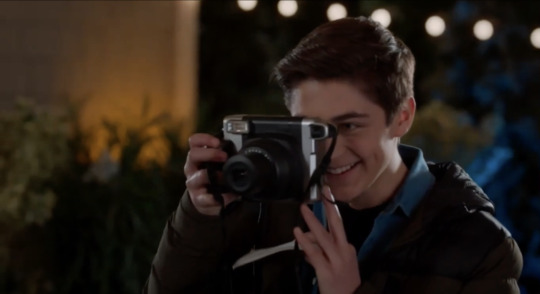
besides this, andi's artistic nature provides the perfect excuse for plenty of colorful, crafty props to amplify the visuals and the tone. obviously, as i discussed before, andi shack is the best example of this because it's filled with interesting props. but you also see bits of andi's (and other people's) crafts popping up throughout the show (ex. the tape on the fridge in the mack apartment, andi's and libby's headbands in "the new girls", walker's shoes, andi's phone case, and of course, the bracelet). not only does doing this really solidify this talent as an essential tenet of andi's character, but it also just makes the entirety of shadyside feel like an extension of andi shack. the whole town is a canvas for her crafts (or art, depending on how you want to look at it. i say it's both), and it immensely adds to shadyside's idealism. because who wouldn't want to live in a world made of andi mack's creations?

and, while it's not exactly a prop, the characters' wardrobe is undoubtedly a major influence on the show's worldbuilding. true to it's nature as a disney channel show, all of the characters are always dressed in exceptionally curated outfits of whatever the current trends are, making the show that much more visually appealing. i won't elaborate too much on this, because i could honestly write a whole other analysis on andi mack's fashion (my favorites are andi's and bex's outfits! and kudos to the costume designer(s) for creating such wonderful and in-character wardrobes!). but, i think it's a really really important aspect of how the show's universe is perceived, so it had to be touched upon.
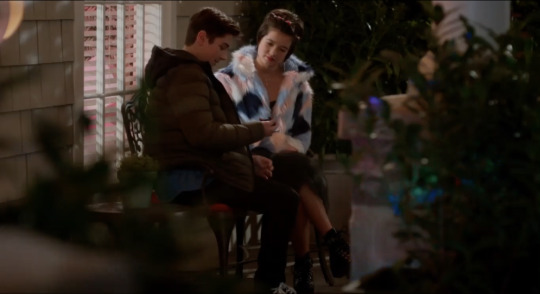
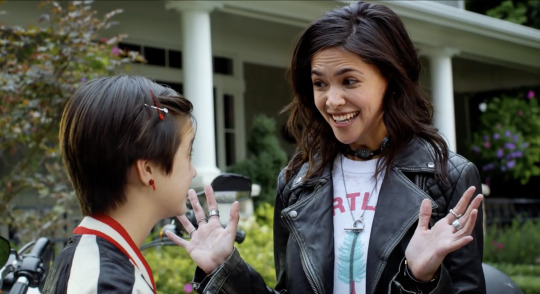
[^ some of my favorite outfits from the show! i am so obsessed with andi's jacket in the finale, and i aspire to be at bex's level of being a leather jacket bisexual]
and lastly, phones. this is a bit of an interesting case (pun intended), because the way they're used fluctuates a bit throughout the show, but i definitely noticed that at least in the first season terri minsky tried to avoid using them altogether. these efforts at distancing from modern tech really grounds the show in it's idealist, nostalgia-heavy roots, so even when the characters start using their phones more later in the show, they don't alter the viewer's impression of the andi mack universe very much.
so, what does all of this have to do with worldbuilding? in andi mack's case, because it's set in a realistic universe and not a fantasy one, a lot of what sets it apart from the real world comes down to tone. because, as much as this world is based on our own, it really does feel separate from it, like an alternate reality that's just slightly more perfect than ours, which makes all the difference. it's the idealism in color and composition in andi mack's settings that makes it so unmistakably andi mack. even the weather is always sunny and perfect (which is incredibly ironic because the town is called shadyside - yes, i am very proud of that observation).
the andi mack universe resides somewhere in this perfect medium that makes it feel like a small town in the middle of nowhere (almost like hill valley in 1955 from "back to the future"), but at the same time like an enclave within a big city (because of its proximity to so many modern, unique, and honestly very classy looking establishments). it is, essentially, an unattainable dream land that tricks you into believing it is attainable because it's just real enough.
all this to say, andi mack does an amazing job of creating of polished, perfect world for its characters. this is pretty common among disney channel and nickelodeon shows, but because most other shows tend to be filmed in a studio with three-wall sets, andi mack is really set apart from them in that it automatically feels more real and tangible. it has its quintessential recurring locations, but it has far more of them (most disney/nick shows usually only have 3-4 recurring settings), and it has a lot more one-off locations. it's also a lot more considerate when it comes to its props, so rather than the show just looking garish and aggressively trendy, it has a distinctive style that's actually appropriate to the characters and the story. overall this creates the effect of expanding the universe, making shadyside feel like it really is a part of a wider world, rather than an artificial bubble. it's idealism is, first and foremost, grounded in reality, and that provides a basis for its brilliant, creative, and relatable storytelling.
tl;dr: andi mack's sets and props give it a very retro and nostalgic tone which makes its whole universe seem super perfect and i want to live there so bad!!
#andi mack#buffy driscoll#cyrus goodman#jonah beck#tj kippen#tyrus#ambi#bex mack#analysis#film analysis#disney channel
94 notes
·
View notes
Note
GIRL WAIT when you say Young Justice do you mean like the show that was on Cartoon Network kind of sporadically and had this episode called failsafe that still kind of haunts me or like-- the comic run. or maybe both who knows.
There isn't as much TOG fic out there as ACOTAR, which surprises me! I haven't lurked there in a while, but if you find anything interesting let me know. The Cruel Prince is also good. I think you will enjoy the series!
ALSO! HAPPY EARLY BIRTHDAY?? Now there is extra pressure to make a good gift, haha. I feel you on the "the worst gifts are the ones that double as birthday and Christmas gifts". dude. not cool.
Hm....my guilty pleasure AU is a probably a time travel AU. When done right, it's an interesting analysis on how characters have grown and changed. And it's satisfying to show old baddies/people who underestimated characters/anyone who doesn't know better what the future holds. Like, that's a total guilty pleasure thing. That's not sophisticated in anyway, that's leftover from when I was a tween reading "characters read the books" fics lo. So yeah, I'll read through the more cringe time travel AUs, but there are some out there that are pretty well done that I enjoy immensely.
Almost to gift giving time! How are you doing on your present? I would like to be able to say I've made substantial progress....and...ya know what. I have. Sort of. The word count hasn't changed but the plot is knitting itself together, and once I have that I'll be good. I think, haha.
BESTIE OMG HAHAHAHA YES I MOST CERTAINLY DO MEAN THAT SHOW!!! Good lord when I say I was obsessed that’s an understatement hahahaha Artemis was my girl and Artemis & Wally were the absolute blueprint and failsafe in particular RUINED me
I just finished Snakes & Daggers by heirofflowers that an AU of Rowaelin if they had the lives they should’ve (no valg basically) that was great!!! I also just finished TCP last night and am holding off on TWK until I do a few more productive things lol.
THANKS FOR THE HAPPY EARLY BIRTHDAY!
Ooooh I’m also a slut for time travel AUs both good and bad (if you’re a Star Wars fan I highly recommend Don’t Look Back by this-acuteneurosis it’s a Leia goes back to the prequels and the world/politics building is INSANE). If you have any recs lmk!!!
I am uhhhhhh not doing super hot on my gift yet to be honest hahaha. Similar to you writing for Nesta, I’m gonna be writing for Elain whom I really have not given much thought to previously so I’m still trying to sus that out oops.
2 notes
·
View notes